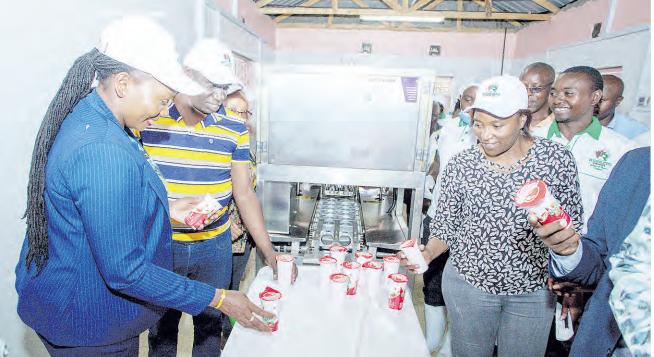
Dairy farmers affiliated to Rung’eto Farmers Cooperative Society in Gichugu, Kirinyaga county, have a reason to smile following the launch of their first yoghurt product.
The cooperative has made the stride through the support of Wezesha Kirinyaga Empowerment Programme implemented by the county government.
The government helped instal a yoghurt making plant with the capacity to produce up to 200 litres per hour at the cooperative, enabling it to launch Runto yoghurt.
Cooperative chairperson Joyce Wanjiku said value addition will not only provide enhanced income for farmers but also enable them to have their own branded product.
“Having our own brand makes us proud and will put our cooperative on the map across the country,” she said.
The product will be sold in shops across the country.
Wanjiku lauded the county government for its support, saying the cooperative had over the years received milk coolers and transport haulers among other equipment that have reduced its post-harvest losses and helped generate more income.
The cooperative produces about 9,000 litres of milk daily, up from the 3,000 it produced before receiving the county support.
This created the need for value addition.
The cooperative contributed 30 per cent of the funds for setting up the yoghurt project while the government gave the rest.
The county offers subsidised artificial insemination and animal feeds and supplies cooperatives with milk coolers and back-up generators.
Farmers have been trained on livestock diseases and husbandry, capacitating them to boost their production.
The county has about 90,000 dairy cows that produce an average of 65.3 million litres of milk annually.
Agriculture executive John Gachara said Kirinyaga has huge potential for dairy production and interventions by the county administration have resulted in notable improvements.
“The county government is committed to making dairy farming a viable economic engine in Kirinyaga. We are achieving this by improving our dairy cattle breeds as well as improving access to affordable and quality animal feeds”.
Gachara said the objective is to increase the average milk production per cow from seven to 20 litres and can only be achieved through quality breeding.
He encouraged farmers to take full advantage of the dairy sector revitalisation initiatives, emphasising that higher productivity will lead to a stronger local economy.
“We want dairy farming to be lucrative for our farmers.Expanding into yogurt production and other value-added products like pasteurised milk means we are creating more opportunities for growth,” he said.
Finance CECM Jackline Njogu said other co-operatives such as Kirima, Pondago, New Ngariama, Rukingo and Kirinyaga Dairy have also benefitted from the revitalisation initiatives.











